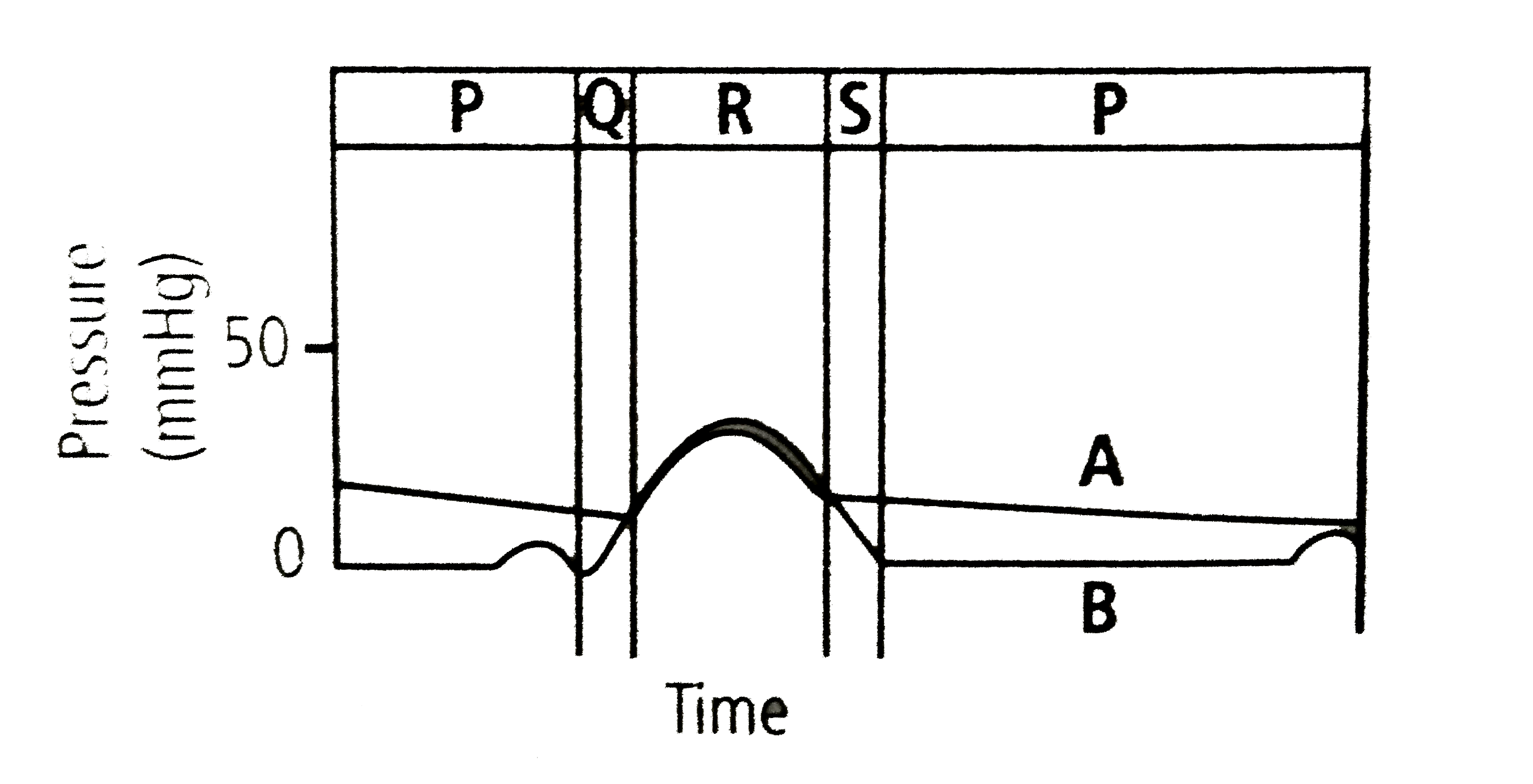Refer to the given figure in which A refers to pulmonary artery pressure and B refers to right ventricular pressure. Identify P,Q,R and S in the figure and match with the list (i-iv) given below
(i) Isovolumetric ventricular contraction
(ii) Ventricular ejection
(iii) Isovolumetric ventricular relaxation
(iv) Ventricular filling

P-(iv),Q-(iii),R-(ii),S-(i)
P-(ii),Q-(iii),R-(i),S-(iv)
P-(iv),Q-(i),R-(ii),S-(iii)
P-(i),Q-(ii),R-(iii),S-(iv)
The correct Answer is:C
The pressure changes in the right ventricle and pulmonary arteries are qualitatively similar to those for the left ventricle and aorta. These are striking quantitative differences, however. Typical pulmonary artery systolic and diastolic pressures are 25 and 10 mm Hg, respectively, compared to systemic arterial pressures of 120 adn 80 mm Hg. Thus the pulmonary circulation is a low-pressure system. Despite the difference in pressure during contraction, however, the stroke volumes of the two ventricles are the same. During isovolumetric contraction and relaxation, the ventricular volume does not change, though the ventricular pressure increases and decreases respectively.
Topper's Solved these Questions
- BOOK - NCERT FINGERTPS ENGLISHCHAPTER - BODY FLUIDS AND CIRCULATIONEXERCISE - EXEMPLAR16videos
BODY FLUIDS AND CIRCULATION
- BOOK - NCERT FINGERTPS ENGLISHCHAPTER - BODY FLUIDS AND CIRCULATIONEXERCISE - CORNER1videos
BODY FLUIDS AND CIRCULATION
- BOOK - NCERT FINGERTPS ENGLISHCHAPTER - BODY FLUIDS AND CIRCULATIONEXERCISE - Body Fluids And Circulation151videos
BODY FLUIDS AND CIRCULATION
- BOOK - NCERT FINGERTPS ENGLISHCHAPTER - BIOMOLECULESEXERCISE - Biomolecules137videos
BIOMOLECULES
- BOOK - NCERT FINGERTPS ENGLISHCHAPTER - BREATHING AND EXCHANGE OF GASESEXERCISE - Breathing And Exchange Of Gases140videos
BREATHING AND EXCHANGE OF GASES
Similar Questions
Which of the following cells does not exhibit phagocytic activity ?
View SolutionAssertion : RBCs are devoid of nucles in most of the mammals
Reason : Entire cytoplasm of RBCs is filled protein called haemoglobin.01:37View SolutionpH of blood
01:37View SolutionThe four elements called "big-four" which make up 95% of all elements found in a living system are
05:36View SolutionStatement 1 : Respiration is most efficient in the insects, among the invertebrates.
Statement 2 : In the insects, air is carried directly to the cells by tracheoles.02:31View SolutionRefer to the given figure in which A refers to pulmonary artery pressure and B refers to right ventricular pressure. Identify P,Q,R and S in the figure and match with the list (i-iv) given below (i) Isovolumetric ventricular contraction (ii) Ventricular ejection (iii) Isovolumetric ventricular relaxation (iv) Ventricular filling
03:12View SolutionVentricular contraction in command of :−
02:02View SolutionVentricular contraction in command of :−
01:58View SolutionThe ventricular muscles relax and the ventricular pressure falls causing the closure of semilunar valves. These events are related to
02:02View Solutionनिलय संकुचन किसके नियंत्रण में होता है ?
02:11View Solutionनिलयों का संकुचन केन्द्र होता है-
02:13View SolutionRight ventricular wall is thinner than the left ventricular wall. Why ?
03:50View SolutionIn ECG of a normal person, T-wave represents ventricular relaxation and ventricular repolarisation
View SolutionRight ventricular wall is thinner than the left ventricular wall. Why ?
01:39View SolutionVentricular systole, Ventricular diastole and joint diastole completes in
02:30View Solution

